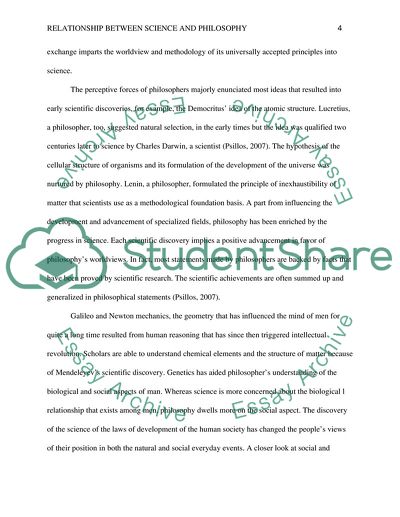Cite this document
(“Discuss the relation between science and philosophy, and whether there Essay”, n.d.)
Discuss the relation between science and philosophy, and whether there Essay. Retrieved from https://studentshare.org/philosophy/1628802-discuss-the-relation-between-science-and-philosophy-and-whether-there-is-still-a-meaningful-place-for-philosphy-in-the-contemporary-world-if-there-is-use-an-example-of-a-philosophical-issue-to-illustrate-this
Discuss the relation between science and philosophy, and whether there Essay. Retrieved from https://studentshare.org/philosophy/1628802-discuss-the-relation-between-science-and-philosophy-and-whether-there-is-still-a-meaningful-place-for-philosphy-in-the-contemporary-world-if-there-is-use-an-example-of-a-philosophical-issue-to-illustrate-this
(Discuss the Relation Between Science and Philosophy, and Whether There Essay)
Discuss the Relation Between Science and Philosophy, and Whether There Essay. https://studentshare.org/philosophy/1628802-discuss-the-relation-between-science-and-philosophy-and-whether-there-is-still-a-meaningful-place-for-philosphy-in-the-contemporary-world-if-there-is-use-an-example-of-a-philosophical-issue-to-illustrate-this.
Discuss the Relation Between Science and Philosophy, and Whether There Essay. https://studentshare.org/philosophy/1628802-discuss-the-relation-between-science-and-philosophy-and-whether-there-is-still-a-meaningful-place-for-philosphy-in-the-contemporary-world-if-there-is-use-an-example-of-a-philosophical-issue-to-illustrate-this.
“Discuss the Relation Between Science and Philosophy, and Whether There Essay”, n.d. https://studentshare.org/philosophy/1628802-discuss-the-relation-between-science-and-philosophy-and-whether-there-is-still-a-meaningful-place-for-philosphy-in-the-contemporary-world-if-there-is-use-an-example-of-a-philosophical-issue-to-illustrate-this.


